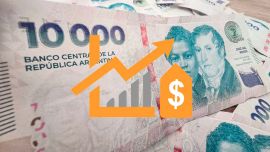New President Alberto Fernández was on the brink of passing his first legislative test at press time last night, with government officials expecting his sweeping emergency economic reform package to pass through the Senate sometime on Saturday.
As senators opened debate on the new president’s sweeping legislative package at 4pm Friday afternoon, government officials publicly affirmed they “had the numbers” for the bill’s approval, thanks to the unified Peronist caucus in the upper house.
“There is a comfortable number [of votes] for the law to pass,” Senator Alfredo Luenzo told the El Destape radio station.
Cristina Fernández de Kirchner, who led the nation as head of state between 2007 and 2015 and now oversees the Senate in her capacity as vice-president, led the debate.
She started things off colourfully enough, ridiculing the leader of the Frente de Todos caucus, Jose Mayans, for addressing her as “presidente” and not “presidenta,” which the vice-president said revealed his machismo.
LOWER HOUSE APPROVAL
The package cleared the Lower House early Friday morning after a 16-hour marathon debate. Lawmakers approved it with a tally of 134 votes for and 110 against.
Despite a vocal opposition, the government managed to secure the votes needed after agreeing to concessions required by lawmakers who said they’d refrain from starting official debate until their demands were met.
Changes include lowering the export taxes on oil, gas and mining proposed in the original draft, providing tax relief for small farmers and the withdrawal of a clause that would have given the president widespread discretion to intervene in dozens of state-run organisations.
Taxes on hydrocarbon and mining exports could still reach eight percent while duties on soy exports could reach as much as 33 percent, with maize facing a 15-percent levy.
Fernández’s administration says 70 percent of the new revenue will be used for social programmes and the rest for infrastructure and housing.
The legislation will also issue a state of emergency in a number of key areas, such as the economy and healthcare, though lawmakers went on to debate it article by article.
“I have told the president of our party in the Lower House to improve the bill,” Fernández tweeted on Thursday, minutes after debate commenced.
The president said he wanted to “build trust” on the issue, though emphasised he had the votes to force through the package, if needed.
MEASURES AND TAX-HIKES
Fernández’s plan involves tax hikes on foreign currency purchases, agricultural exports and car sales.
The tax on the former – christened the “tourist dollar” – will affect purchases made on credit cards made in foreign currency, cash withdrawals overseas and payments from Argentina for services that bill in dollars, including platforms such as Spotify and Netflix.
Fernández has also retained the US$200-limit on dollar purchases put in place by the Mauricio Macri administration.
The legislative package will also hand the new president special powers to renegotiate debt terms – with Argentina seeking to restructure its debt with private bondholders and the monster US$57-billion credit-line the International Monetary Fund – and proposes a 180-day freeze on utility tariffs as part of a plan to boost spending on social welfare programmes while reining in government debt. One such programme is a plan that would see the issuing of more than two million food cards to Argentina’s most disadvantaged families.
Some proposals have proved to be unpopular in certain quarters. A few hundred supporters of former president Maurico Macri demonstrated outside Congress on Wednesday.
“Concentrating so much power in the government is the wrong path and there’s no justification for this emergency,” said Mario Negri, an opposition Juntos por el Cambio deputy.
Opposition lawmaker Luis Pastori agreed. “We recognise that in these four years the economy fell and poverty and inflation increased, with public debt with liquidity problems. But [the Mauricio Macri government] also lowered the fiscal deficit and primary public spending and lowered tax pressure. Unemployment fell a little. Are we really in emergency?”
In her typically outspoken style, Cambiemos heavyweight and outgoing national deputy Elisa Carrió, who will step down in 2020, compared Fernández to Julius Caesar, saying his quest to win “super powers” for the Executive branch was akin to the actions of a dictator.
“The rights and freedom of Argentines would remain in the hands of Alberto Fernández for six months,” she warned.
‘SOCIAL SOLIDARITY’
Government-aligned lawmakers countered that the package was necessary, with Argentina gripped by economic and social calamity.
“Six out of every 10 Argentine children live in poverty, we can’t lose any more time,” said Eduardo Bucca, a Peronist lawmaker from the ruling coalition, representing Buenos Aires Province.
“The law is called ‘Social Solidarity’ and that’s what is needed when the emergency is economic, health, financial, fiscal, debt,” declared Frente de Todos deputy Carlos Heller during a session in the Chamber of Deputies on Thursday.
Poverty is nearing 40 percent in Argentina, which is in recession and has suffered 18 months of economic crisis sparked by a currency crash. The economy is expected to shrink by 3.1 percent in 2019, inflation is hovering around 55 percent and external debt is about 90 percent of GDP.
The government hopes tax incentives will improve the situation for small- and medium-sized businesses.
Announcing the reform plan earlier in the week, Economy Minister Martín Guzmán said the measures seek to “protect sectors that are highly vulnerable.”
They include a six-month freeze on public utility prices and a 10,000-peso (US$160) bonus for low-income pensioners.
During debate in the Senate, lawmakers also brought up the idea that retired judges, diplomats and former presidents or vice presidents should be excluded from the payment adjustment freeze that will apply to many other pension-holders not considered low-income. This idea generated pushback from critics who said the idea was hypocritical given the “solidarity” of the law named as such.
Speaking prior to the debate, Cabinet Chief Santiago Cafiero called on lawmakers to pass the bill, warning that “the economy is in virtual default and 40 percent of our inhabitants are [living] below the poverty line.”
Breaking down the legislative package
Here are the main proposals sent to Congress:
DEBT NEGOTIATION
– Authorise the Executive to carry out measures necessary to ensure the “fiscal sustainability” of public debt
– Authorise government to issue as much as US$4.6 billion of 10-year, dollardenominated notes to the Central Bank in exchange for hard currency, which will be used to service dollar debt payments
BUDGET
– Allow the Executive to reassign resources pre-allocated in the 2019 budget
SALARIES
– Boost salaries, attending to the most vulnerable sectors and creating mechanisms to facilitate salary agreements
ENERGY
– Utility prices will remain unchanged for 180 days
– Maintain electricity and natural gas subsidies under federal jurisdiction and authorise the government to start the renegotiation process
– Authorise the Executive branch to “administratively intervene” in national energy regulators
EXPORT TARIFFS
– Soybean export taxes may rise to 33 percent from 30 percent
– Wheat and corn export taxes may rise to 15 percent from 12 percent
HEALTHCARE
–Ensure supply of essential medicines for outpatient treatments for patients in “conditions of high social vulnerability”
US DOLLAR PURCHASES
– 30-percent tax on dollar purchases during five fiscal periods
– Government to use 70 percent of those proceeds for social security
– Tax also applies to foreign transactions
TAXES ON THE WEALTHY
– Tax of 0.75 percent on assets between US$3 million and US$6.5 million
– Tax of 1 percent on assets valued between US$6.5 million to US$18 million
– Tax of 1.25 percent on assets US$18 million and higher
– TIMES/PERFIL/NA/AFP


























Comments